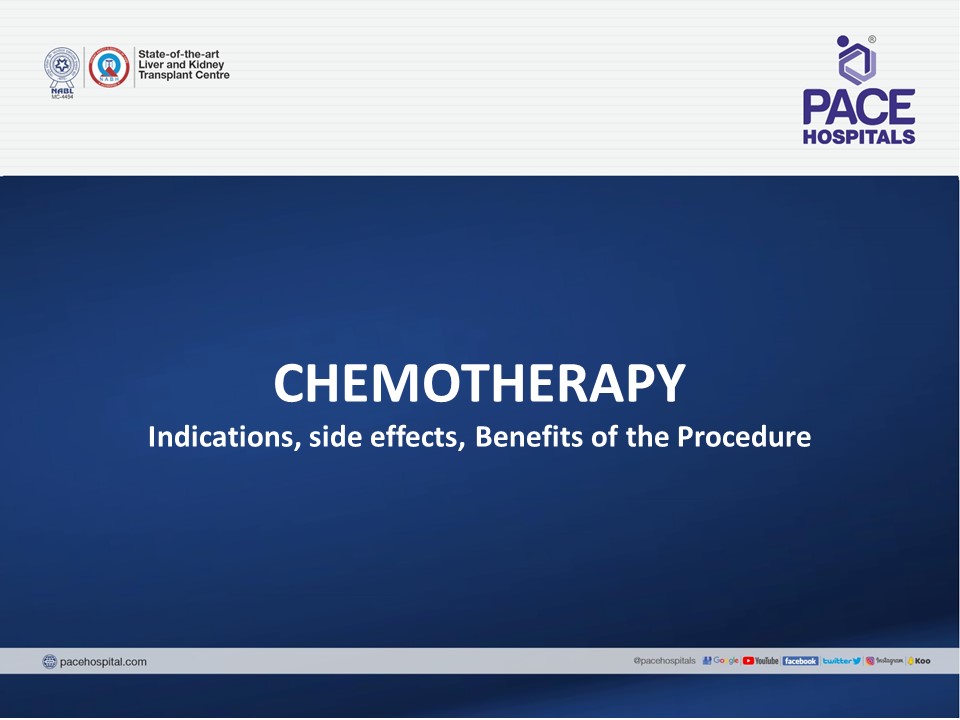Chemotherapy - Indications, side effects, benefits of the procedure - PowerPoint PPT Presentation
Title:
Chemotherapy - Indications, side effects, benefits of the procedure
Description:
PACE Hospitals is one of the best hospital for chemotherapy in Hyderabad, Telangana, India. It has a team of experienced oncologists who are experts in the latest cancer treatments. The hospital also has a state-of-the-art chemotherapy facility that provides a comfortable and supportive environment for patients. Department of Oncology offers a variety of chemotherapy options, including oral, injectable, and intrathecal chemotherapy. We also offers supportive care services, such as nausea and vomiting prevention, hair loss management, and pain management. – PowerPoint PPT presentation
Number of Views:6
Title: Chemotherapy - Indications, side effects, benefits of the procedure
1
CHEMOTHERAPYIndications, side effects, Benefits
of the Procedure
2
- PACE Hospitals is one of the best hospital for
chemotherapy in Hyderabad, Telangana, India. It
has a team of experienced oncologists who are
experts in the latest cancer treatments. The
hospital also has a state-of-the-art chemotherapy
facility that provides a comfortable and
supportive environment for patients. - Department of Oncology offers a variety of
chemotherapy options, including oral, injectable,
and intrathecal chemotherapy. We also offers
supportive care services, such as nausea and
vomiting prevention, hair loss management, and
pain management.
3
- What is chemotherapy treatment?
- Chemotherapy is a cancer treatment that uses
drugs to kill cancer cells. It is a systemic
treatment, which means that the drugs travel
through the bloodstream to reach cancer cells
throughout the body. - Chemotherapy is used to treat many different
types of cancer, but not limited to cancer of
breast, lung, prostate, colon, ovarian, pancreas,
stomach, and leukaemia. It can be used alone or
in combination with other treatments, such as
radiation therapy or surgery. - The side effects of chemotherapy can vary
depending on the type of drug and the dose used.
4
- Chemotherapy Meaning
- The treating of cancer with chemotherapeutic
agents could be the basic chemotherapy
definition. Whether traditional or targeted, the
ultimate goals of chemotherapy are to prevent
cancer cells from multiplying, invading,
metastasizing (spreading), and ultimately killing
the patient. - Paul Ehrlich, a German chemist, coined the term
chemotherapy which literally means "the
treatment of diseases by chemicals" in Greek
(chemo-, "chemical," and the therapeia,
"healing"). He researched the usability of
various chemicals as medications to treat several
infectious disorders. He was also the first
scientist to examine the usability of animal
models to evaluate a range of compounds for their
possible anti-disease activity. Due to his
contributions, Paul Ehrlich is also called the
Father of Chemotherapy. - In the 1960s, radiotherapy and surgery were the
cornerstones of cancer treatment. As metastases
(cancer spread to other parts of body) and cancer
recurrence following surgery and radiation
therapy became clear, combination chemotherapy
began to acquire importance.
5
- Why does cancer occur?
- While there are various carcinogenic risk factors
and cancer triggering factors, it is ultimately
the genes which cause cancer. The carcinogenesis
(birth of cancer) is the process by which normal
cells are transformed into cancer cells due to an
imbalance in the stimulatory and inhibitory
growth signals (cell production and cell death
signals). - In carcinogenesis, normal mechanisms such as
apoptosis (programmed cell death) and senescence
(natural aging of cell) do not function properly
and cannot control excessive cell division.
Telomerase is an enzyme that enable cells to
proliferate endlessly. While the telomerase
activity and expression in most normal human
cells is suppressed, in most cancer cells it is
reactivated. - ?Strategies to inhibit telomerase activity in
cancer cells comprise one of many new molecular
approaches that are currently being studied.
Efforts are underway to target key genes,
proteins, and receptors that facilitate cancer
cell growth.
6
Routes of Chemotherapy Administration
- Depending on the stage and type of the cancer,
chemotherapeutic administration can be either - Oral chemotherapy (through mouth)
- Intravenous (injected into vein)
- Intraarterial (injected into artery)
- Intramuscular (injected into muscle)
- Intraperitoneal (injected into abdomen)
- Topical (applied on the skin)
- The condition of the patient could prompt the
oncologist and healthcare team to provide the
chemotherapy alone or with other treatments, such
as surgery, radiation therapy, or biologic
therapy.
7
(No Transcript)































